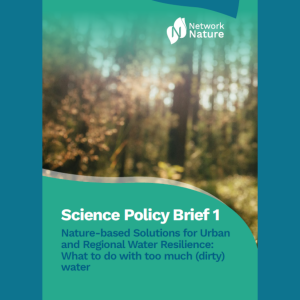
In early 2025, 33 researchers, policymakers, and practitioners came together to discuss the role of nature-based solutions (NbS) in enhancing urban and regional water resilience.
The discussion was framed by two key policy developments: the forthcoming Water Resilience Strategy, a comprehensive, multi-annual, cross-sectoral roadmap with milestones through 2040 and the recast of the Urban Wastewater Treatment Directive, which aims to protect the environment and human health by ensuring proper collection, treatment, and discharge of urban wastewater and specific industrial discharges across the EU.
To support discussions and spark ideas, experts from the CARDIMED, NICE_NbS, NBRACER, and MULTISOURCE projects shared their firsthand experiences and successful pilot projects. These examples highlighted not only the effectiveness of NbS in supporting water-related goals, but also their inherent beauty and multifunctionality.
Participants explored how NbS can be mainstreamed into urban and regional water resilience strategies. These solutions are not only cost-effective but also multifunctional, offering a range of co-benefits that contribute to climate adaptation, biodiversity, and community wellbeing. However, unlocking their full potential requires coherent policies that avoid conflicting interests, especially as water governance is often spread across multiple departments and agencies.
Overcoming siloed approaches is essential. Holistic planning with clearly defined responsibilities for integrating NbS, supported by shared governance models, standardized procedures, and flexible regulatory frameworks, is essential. While evidence increasingly shows that NbS can outperform traditional grey infrastructure in many contexts, securing long-term investment remains a challenge. More effort is needed to make NbS appealing to investors and businesses.
Ultimately, the long-term sustainability of water-related NbS depends on strong local stewardship. This can be fostered through participatory processes that actively involve and empower communities in the planning and management of water resources.
Read the full policy brief.
Short on time? Check out the summary.
